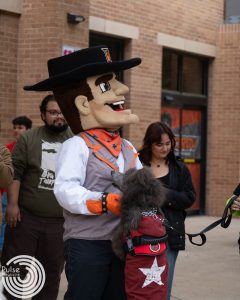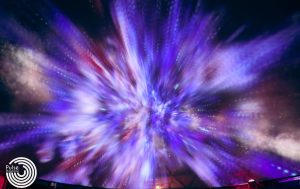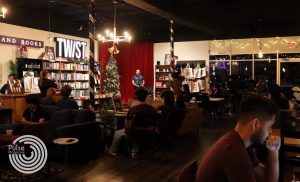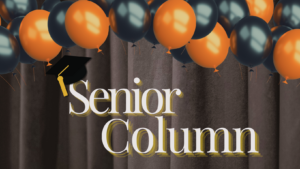Not Just Learning a Language
The ASL Club at UTRGV is an organization that offers opportunity in learning, and socializing within the study of American Sign Language. The organization is run by President Ana Lilia, an Interpreter major with a concentration in Spanish, which means a focus in Spanish, English and ASL Translation/Interpretation. She also has a minor in Rehab Services, and has been with the ASL club since 2017. Vice-President Rebecca Villarreal also studies American sign language Interpretation with a concentration in Communication. She’s been involved with the organization for almost a year. I had a chance to sit down with the officers and let them tell me what the ASL club was all about.
- What made you want to get involved with the organization?
Ana: For me personally, since I am majoring in ASL and interpreting, it is not just about my major. I kind of see it as a way to, you know, to meet new people, getting to learn about their culture, because it is really different. It’s not just about the language, but you also have to learn about the culture and how everything connects with the language. It opens opportunities for yourself. You learn a lot about the language, you learn about the culture, but you also get to meet new people and have new friends, and kind of like socialize and improve your social skills, and language skills in general.
Rebecca: For me, I joined because last semester was my first semester in the American Sign Language Interpretation program and I was struggling a little bit and I needed somebody to just like polish my skills. So, I joined and I would go to all the events and all the meetings. And I think that’s where I improved a lot because I was actually getting practice and socializing with others which is what I lacked because we took classes in the summer and everything was really fast paced, and so that [the ASL Club] helped me catch up and completely immerse myself and learn a lot more.
2. How would you describe the ASL organization?
Ana: Our main purpose is to provide students from different backgrounds, and not just who are taking ASL courses or who are majoring or minoring in ASL, but anyone who is interested in learning and getting to know the language and getting to know the culture itself. We provide opportunities for those students that are interested to join or just like be involved. We hold many different events where we can provide them with exposure to the culture and language, because I do feel that experience impacts the way you learn. If they have the opportunity to have experience in certain situations then I guess it would be easier for them to understand the culture and the language. Also, with these events, members have the opportunity to practice and improve their skills because I know that some of our members have mentioned that they don’t have anyone to practice with and with us, hosting these types of events, they do have the opportunity to practice with other students that are also learning and can kind of understand themselves with each other because they’re helping other students. They’ll be like “Oh I’m learning also” and they’ll be like “Oh yeah, I’m also a beginner” and it helps them to learn how to work as a team overall and just support each other.
Rebecca: I would describe us [the ASL club] as an encouraging environment where we can support our students and our members, and we encourage them to learn ASL and to learn about the deaf community as well and deaf culture.
3. Do we have a large Deaf community on campus?
Ana: Yes, we do have a large community, even though it might not be known and it is a minority group. Here in the Valley we do have a large Deaf community which also supports the ASL club a lot and we are really grateful for that because we received support for students and from the community, and it’s just really good to have.
Rebecca: I’m not too sure about the Deaf community on campus, I’m not to sure about the numbers, but I know that the community is big in the Valley. I believe that there are 20,000 (members of the Deaf community in the Valley).
Ana: Yes, we do have about that estimate, and at the university it’s not a big group but we do have several students that are either deaf or hard of hearing, so we do have a small group within the university. But yes, here in the Valley we do have about 20,000 people.
4. What are some things/events the organization does to support and involve UTRGV students?
Ana: Well, we have educational events, we also have social events. Some of the education events we host is like the “Deaf Awareness” where we have professors from the university and some people from the community come, and we’ll have a panel with them where they can just share their experience, share some of the issues that they have approached within society and just to discuss different topics, just to educate more people about it and students also because they might know a little bit. When they [students] go they’re like, “well, I never realized that people go through these issues” and it is something that as a hearing person, which is what something that we [people who can hear] are called within the Deaf community. They’ll be like “Well I neve realized that deaf person actually goes through this” because we don’t really have that experience. When you meet someone [who is deaf] and kind of socialize with them and [if] they go to in an in–person event, you kind of see that difference in communication and not like how you would experience it by yourself. Some of our social events, one of our main ones, is a talent show. We encourage students to perform something in ASL. They can do acting, they can do jokes, they can do stories, small skits, you know, anything – and we offer prizes for that. So, we encourage members to have fun, but learn at the same time and this is something we do a lot. We try to host it once a year or once every semester, and we’re actually hosting one this semester after not holding one after two consecutive semesters because of everything that was happening [Covid-19]. A lot of people and a lot of students in general are really interested in that. Other events that we hold is the Among Us game. We recently had an Among Us game, where we got on Zoom and had break–out rooms. They [ASL members] get to also have fun and also learn at the same time and get to practice their signing skills. And just in case they have any questions in general, we do have our major students provide interpreting services. It’s kind of like a good practice for them, before going into the real world. It’s also good practice for the students because if we just do like a lecture thing, it is kind of boring, why lie right? So, we try to do this thing where we teach something but we also incorporate an activity that way it doesn’t feel like a class. This is not a class. This is a club where we try to make things fun and have students learn. Also, we have guest speakers, and these are professors, interpreters, or people from agencies that provide services to the Deaf community just to inform people and students in general about if something happens. Where they can seek programs, where can they seek help or information. The guest speakers, they share their experiences, we ask questions, and then at the end we do have an open Q & A where anyone from the audience can ask questions they might be thinking about or are curious to know, like “if this were to happen, how would you approach it?” I think all those events truly impact students, whether they’re there to learn the language, if they want to, or they’re with us because they’re taking classes or they’re minoring or majoring [in the program]. In general, it truly does help everyone.
Rebecca: Like Ana said, we do have a ton of different events. One thing we do try and emphasize and focus on is that you know we try to make these events interactive. So, like Ana said, we have activities and we try to encourage members to participate. We do have interpreters so they don’t feel like they don’t understand anything. We do help them and we do encourage them to participate so I do think that is one of the very beneficial things about our events.
5. How has the organization been coping with COVID-19?
Ana: When Covid first struck it was kind of like a little transition. So we did have to adjust, you know, having everything online. And since ASL is an official language, I know it is hard for us students to be on Zoom because some don’t like to turn on their cameras but they’re just shy, right? I think it does impact the way we socialize. Also, because through Zoom we try to have many different activities and have them (the members) socialize, but it is hard to have those activities because back when we were in–person we had like games, so it was more interactive than what it is now, but we do try our best and we do have good outcomes. So far, we haven’t had any issues with that. The good thing that comes with now being online is that we now get to have members from Brownsville because the ASL club is mainly here, on the Edinburg campus. It’s not in Brownsville yet. We don’t really have a sponsor yet. Hopefully in the future, we will be able to have an ASL club in Brownsville too. But Rebecca, she is our new officer, she is from Brownsville so that’s an amazing opportunity that came with being online after Covid.
Rebecca: It is hard because ASL is a visual language and you use facial expressions, you use body movements and those things sometimes are hard to express on Zoom, on this little screen. So it is difficult, but we find our ways around it. We encourage more members to join us, and we still figure out a way to utilize the chat box or we’ll have an interpreter. There are many ways around it, but we still learn and it’s been an awesome thing to be able to spread awareness and spread our organization to members who are at different campuses as well.
6. How many members would you say that you have currently?
Ana: Well, we have nine members, like official officer members because, like I mentioned, the ASL club is open to everyone. Any student can actually join and not pay membership, just join to learn. But if you do want the benefits, which is a stole and a pin from the club, then you do need to pay for membership. But counting both sides we do have about a hundred students and official members we have about twenty.
Rebecca: We even have people from the outside, you know, other schools. They come to different events that we have that are open to the public. So a ton of people know about us. They spread the word, so it’s been awesome really.
7. What do you think makes the organization unique to the UTRGV campus?
Ana: I personally think that what makes it unique is that we do work a lot as a team, and we have that leadership to work as a team and support each other. And our advisor [Rosemary Landa, a lecturer for the Communication Sciences and Disorders department], she does support us a lot in many different ways so I’m really grateful for that. Since she is the event coordinator for the major and the minor program, we do know she is busy, but she makes times for us in any little thing that we might do. She’s really supportive. We are thankful for our officers that work together, but not just officers, it’s many members also. The members are like the main root of our organization because without members none of this would have been possible and it has been really awesome to see how our organization has grown a lot since it was barely founded. I think having members show us support it was truly keeps motivating us to try to offer them more things, to have beneficial stuff for them that we know we can provide, resources or opportunities for them in the future. We are really social, and that’s something else that helps our organization stand out from other organizations because we do host a lot of events that are mostly really fun and social activities. I think that’s what truly people like about the ASL club because we educate people, but at the same time they get to have fun. They learn, they socialize, so it’s just a lot of things that come together without you even realizing. It doesn’t even feel like it’s a club because we’re not like other organization where you have meet requirements. It’s more social and we get to understand a lot of students.
Rebecca: I would say our organization is unique because were not only learning the language, we’re learning a culture, and I think that’s something that people don’t realize when they’re learning ASL that its more than just a language, it’s a culture. And we have a strong foundation of ASL users. The majority of our professors are part of the Deaf community, they identify in the Deaf community. And so, with that we get to provide knowledge and awareness to our members, and that’s the thing that’s super important for the community. Especially having such a large Deaf community in the Valley. We wanna bring awareness to ASL and to the Deaf community, so we can spread awareness and language access to everyone. And so that benefits the community and our members and you know, maybe one day, our members are gonna have a Deaf customer or somebody that uses ASL and they can help them. I think that’s super important because you’re going to take these skills and be able to utilize them in our community, and you’re gonna be able to give back and socialize and meet new people. The benefit goes really deep. It doesn’t just go as “oh, I have my language class” or “it’s my core” or whatever. It goes deeper, and you build friendships and can learn about a whole other world that you might have never known about if you weren’t taught it. I’m not a native signer. My first language is English, and so we’re kind of in the same boat with our members. We’re all not native ASL users. We’re learning a language so, we have to learn the language and respect the culture. We do have the support of our professors and our sponsor. She’s a native ASL user, so it’s really awesome because we (members) relate. We’re shy sometimes …and so we learn together. We have close relationships … and we’re all in it together. I think that’s something super awesome.
Ana: We do have several members that are really thrilled to share their experiences. They’re like, “oh look, I learned this and I was able to communicate with this person at work, or at a restaurant or something like that.” They do feel proud and we always encourage our students to feel proud about their skills, to be able to share that. We give them trust, and they trust us to share with us everything they’re going through, or if they’re struggling with homework. I think us having our members feel trust in us, it’s something really rewarding because that way we see ourselves and say, “ok how can I give more to the members” you know, “how can we improve the organization to make it even better for them?”
8. What’s the process in which you get students to join the organization?
Ana: The way we recruit members is getting involved in the involvement fair that university hosts. They have different types of events where you can just go and advertise your events. Sometimes we do get in contact with other students that are working on projects for the school news and things like that. That’s how more people get to know [about us]. Or sometimes we do events and the word gets spread. For example, we do a collaboration with other organizations then people tell other members from other organizations, so they get to know us. But that’s just basically the way we advertise our club, and we do have a good connection with the ASL professors at the university, so they do have their classes where they require students to go Deaf events which are events where deaf people are involved. And since we host events, they [ASL professors] are like, “can my student join this?” So, we do kind of share that connection. Their students can tell their friends and invite other people, and that’s how we to advertise the club.
Rebecca: We also utilize social media a lot. We’re in the generation where social media is in our everyday lives. We really rely on social media to spread the word and we do have people interested from other campuses, but obviously right now it’s physically in Edinburg, but hopefully we will spread to Brownsville. And the process for that, you know, is difficult, because we do need a sponsor and Brownsville only has some ASL classes right now, but we are expanding it. For sure, we will be on the Brownsville campus one day.
—
For more information about the ASL Club at UTRGV, visit their Facebook page and the UTRGV V-Link.





